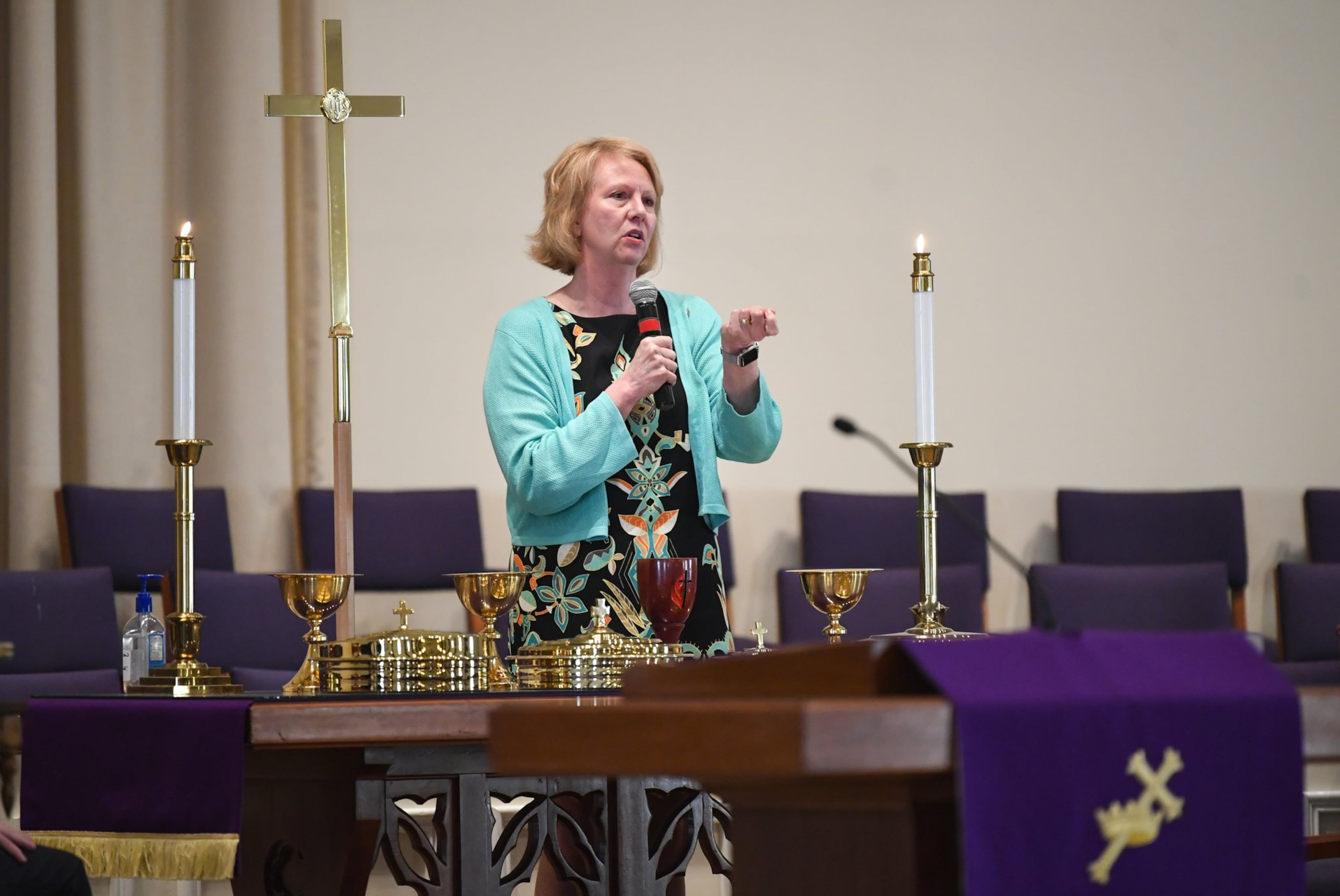United Methodists in Georgia ask: What happens next?

More than 600 people packed Kennesaw United Methodist Church on Sunday to learn how their local churches might be affected by a historic vote last month to reinforce the mainline denomination’s stance against same-sex marriage and the ordination of self-avowed practicing gays.
The meeting opened with the hymn “Amazing Grace” and ended with Communion. Perhaps coincidentally, the meetings are being held during Lent, a period of self-reflection and repentance.
Meeting leaders made it clear from the beginning. The debriefing would not be a debate about the issues.
The decision was made in St. Louis last month at a special General Conference.
Rather, it was organized to provide information about the special session and how the mainline denomination would move forward. What happens to churches that leave the denomination? Will bishops support the Book of Discipline? What will the judicial council do?
Related: Emotion-filled services at United Methodist churches after historic vote
In her many years of ministry, said Bishop Sue Haupert-Johnson in a video that was shown simultaneously in Kennesaw and at a similar meeting in Greensboro, Georgia, she’s had to face people who were heartbroken, perhaps over the loss of a child or those who have been falsely imprisoned.

However, “I’ve never really experienced the kind of heartbreak I did in St. Louis,” said Haupert-Johnson, who’s the bishop for the North Georgia Conference. “It was not so much a heartbreak over doctrine, over which side prevailed. It was a heartbreak over the existential reason for the church.”
There are more than 467,000 United Methodists in Georgia.
Haupert-Johnson said she would use Lent to regroup and asked others to immerse themselves in their spiritual practices, focus on what unites people and “to love as Christ loves.”
The church is reflecting the larger culture in negative ways and it “must stop here.” Haupert-Johnson reached out to LGBTQ United Methodists, saying she realizes they have not felt fully included in the church. “A great harm has been done and you have been singled out and picked on for too long.”
Recently, it was discovered that “a very limited” number of people who were ineligible to vote at last month’s General Conference received voting credentials, but it isn’t believed it was enough to change the results.
Each General Conference, which is held every four years, stands on its own, so anyone can put forth a resolution that would again look at same-sex weddings or the ordination of openly gay candidates for clergy.
Other faith news: Edward Long, son of late New Birth pastor, has radio show
Currently, if a United Methodist pastor performs a same-sex marriage, charges will be brought against him or her within the church, and they would lose their credentials. The proposed action, if approved by the Judicial Council, puts an immediate one-year unpaid suspension in place for the first offense, and the second offense would move toward loss of credentials.
Another proposed change would make it easier for churches that decide to leave. Currently, every UMC property is owned by the United Methodist Church and is held in trust by the local church. If a church decides to leave under the present discipline, those leaving cannot legally carry with them the property or assets. The disassociation petition that is under review by the Judicial Council would change that, stating that if there was a 2/3 vote by church membership to disassociate, the trust clause would be removed and property could transfer with those voting to leave.
“We’ve been down this path before about different issues,” said Terry Walton, district superintendent of the Atlanta Marietta District of the North Georgia Conference. “It gives me hope that we will be stronger because we’re finally facing this instead of kicking it down the road. I think what’s going to happen this year at the annual conferences is that people are going to really be looking at who the delegates are to go to the General Conference. People are going to want to make sure it’s a balanced ticket.”

The North Georgia Conference, which includes more than 800 churches, sent 22 people — half laypersons and half clergy — to St Louis.
Does he expect this to come up again?
“It would shock me if it didn’t, but to what degree in 2020? I hope it won’t pingpong back and forth,” Walton said. “There’s a lot of institutional weariness over this issue.”
It was a close vote. The final tally was 438 to 384 in favor of the “Traditional Plan,” which reinforces — and strengthens — opposition to same-sex marriage and the ordination of self-avowed practicing gays.
Other faith news: Churches work to bridge the generational divide
All the items contained in the Traditional Plan have been sent to the UMC’s Judicial Council for declaratory decisions. The council is looking at the constitutionality of the individual petitions. “We will not be able to confirm the final disposition of this matter until we hear their decision,” said a UMC spokeswoman.
If everything moves forward, the Traditional Plan would take effect in January 2020, just months before the regularly scheduled General Conference in May.
Lynn Haldaman, a member of Christ United Methodist Church in Roswell, said her church has lost five families because of the St. Louis vote.
For her part, Haldaman, a retired school counselor, said she wasn’t particularly fond of any of the proposals. “I’m saddened that we couldn’t come up with something else.”
UPCOMING MEETINGS
LaGrange, Griffin, and Atlanta-College Park Districts
4-6 p.m. Sunday
Cascade United Methodist Church, 3144 Cascade Road SW, Atlanta. 404-691-5770
Atlanta-Emory, Atlanta-Roswell, and Gainesville Districts
4-6 p.m. Sunday
Hamilton Mill United Methodist Church, 1450 Pine Road, Dacula. 770-271-8855

